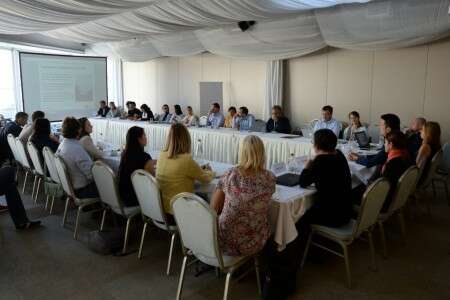Belgrade Open School organized the third annual ‘Move.Link.Engage’ Conference together with Office for Cooperation with Civil Society of the Serbian Government. The topic of this year’s conference was ‘Rethinking Europe and the Western Balkans’. The Conference was held on 18th and 19th of September this year. One of the sessions of the Conference was dedicated to contribution of civil society organizations to the European Integration Process of the Western Balkans countries related to Energy, Climate and Environment.
The session dedicated to contribution of CSOs in areas of Energy, Climate and Environment gathered representatives of civil society organizations and experts engaged in these programme areas. Among them, there were participants of the regional meeting organized by Bankwatch, representatives of Coalition 27 and partner organizations implementing environment-related projects through the ‘Civil Society for EU’ project of Belgrade Open School.
The topic of the session was the gap between the EU’s energy policy which is continuously decreasing reliance on coal in the energy mix, and the Western Balkans countries which are still planning to expand capacities of their coal-reliant energy facilities. Ms Pippa Gallop from Bankwatch presented the research results on the energy sector of Western Balkans countries, once again underlining the importance of civil society organizations in the process through their monitoring and advocacy activities for ‘clean’ energy. Ms Dragana Mileusnić from CAN Europe presented an overview of the Berlin Process, with particular emphasis on the limited space given to CSOs to present their inputs to the decision makers through this process. Mr Aleksandar Macura from RES Foundation presented the experience of his organization in working with local communities related to climate and energy policy. Ms Barbora Poyner from Energy Community delivered presentation on the progress of Western Balkan countries in implementation of EU Energy Acquis.
The conclusions of the session were related to the importance of civil society organizations in policy development in two directions: communicating EU policies and bringing them down to the local level, as well as articulating needs and interests of local communities into concrete inputs for policy development at the national level.
Author of the photo: Belgrade Open School

